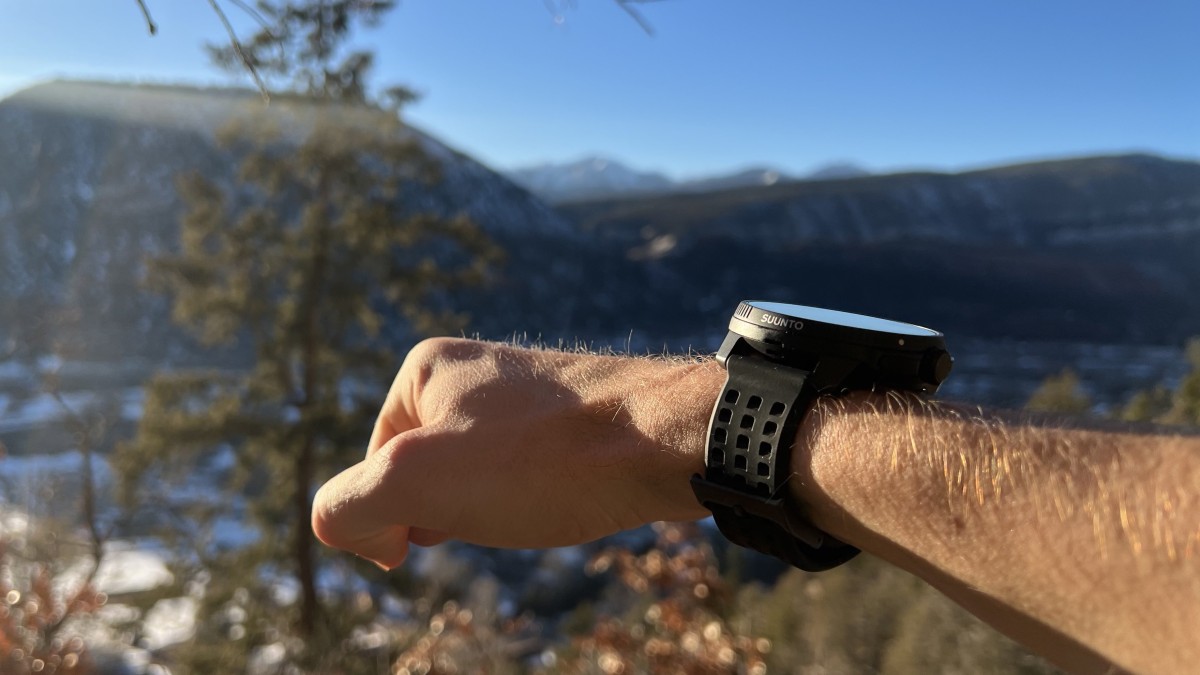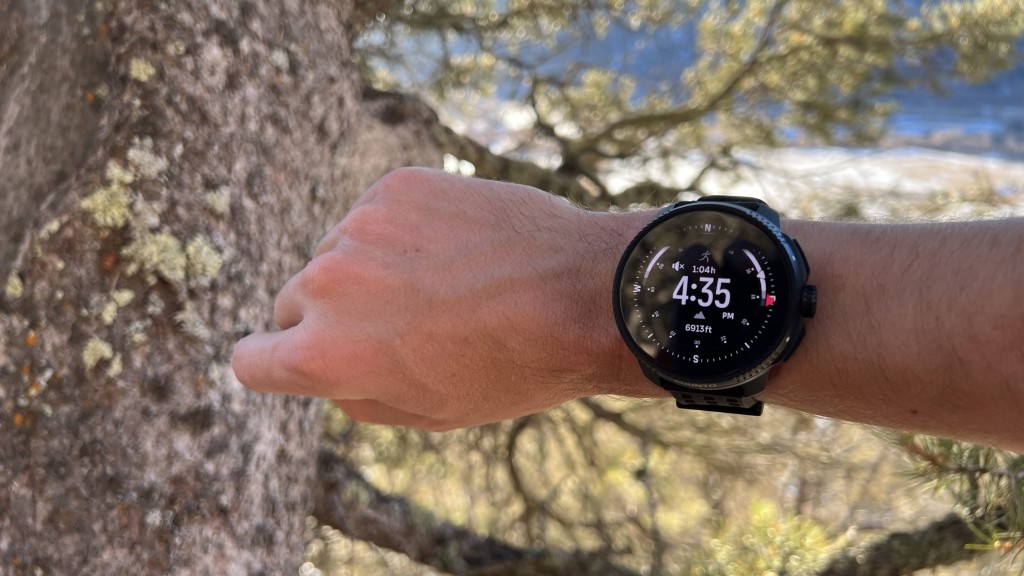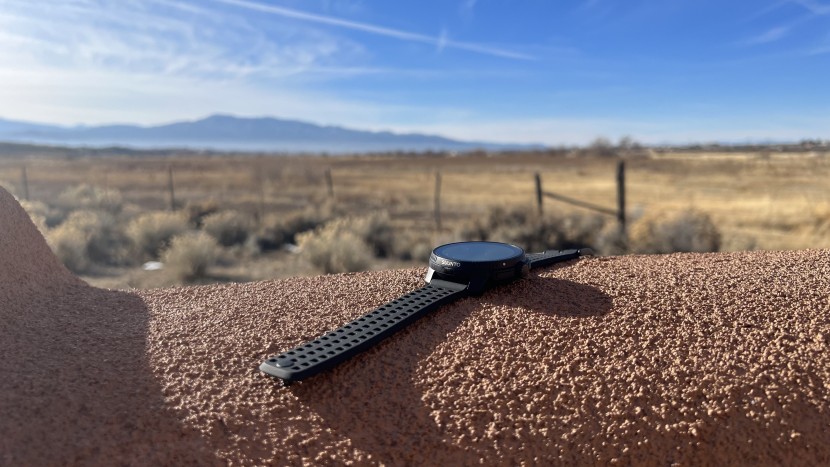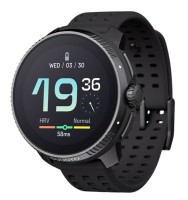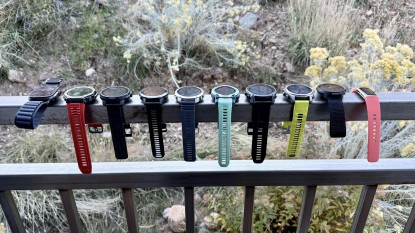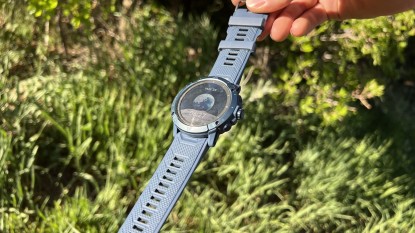
Our Verdict
Our Analysis and Test Results
If you are looking for an upgraded Suunto GPS watch, the Suunto Race is a great option. A new AMOLED display and internal hardware run the menu systems much more smoothly than they did in the past. A new UI also makes the model more straightforward and allows quicker access to on/off features. Also, we love that the cost is competitive, especially with an AMOLED display. With a touch screen, physical buttons, and a rolling crown, there are many ways to interact with this model, which is well-suited for the many activity types that the Suunto Race supports. Recent firmware updates have significantly enhanced the Suunto Race. Notably, the addition of 22 new sport modes — including Pilates, Parkour, and Ski Mountaineering — expands its versatility. Improvements in GPS accuracy, sleep tracking, and heart rate monitoring further solidify its standing as a top-tier multisport watch.
Accuracy
We determined our accuracy score by rigorously testing the GPS chipset and heart rate sensor. Each watch was taken out the same day on a known 2.8-mile course for GPS accuracy, and the recorded distance was compared to the actual 2.80 miles. For heart rate accuracy, we wore a watch on each wrist while running for 0.5 miles and compared the readings to our Polar H10 chest strap, which is known for its scientific accuracy. The scores from both tests were averaged to obtain an overall accuracy score. For the heart rate tests, the watches were tightened equally to ensure a controlled fit. We then exported and matched the data timestamps to facilitate a precise comparison between the chest strap heart rate monitor and the GPS watch.
We found the Suunto Race fit great on our wrist, so we were confident in the ability of the heart rate monitor. The watch provided =/- 0.65 BPM during our testing, which was excellent and ranked among the best. The watch also performed almost perfectly for GPS testing, giving us +/- 0.02 miles. One downside of this unit is that only one Bluetooth device type can be paired at a time, so you may consider a different model if you have multiple HR monitors or power meters. This is easily one of the most accurate Suunto watches we've tested, and the data supports it. Software updates have also introduced a new treadmill calibration method that operates independently of outdoor runs, ensuring more accurate indoor activity tracking. Additionally, the pool swim distance algorithm has been refined, enhancing accuracy for swimmers.
Activity Use
We'd recommend the Suunto Race for most users unless you are concerned with maximum battery life. It has an AMOLED display, which is great during activities due to its brightness. The Race has the ability to display detailed maps, with routing and breadcrumb maps that look excellent on the AMOLED display. Interaction with the device is also a plus; we found this to be one of the more fluid software experiences, and the physical buttons and crown are a nice touch. Many different sport modes are listed, and Suunto has a long history of providing support for Multi-sport, which is also at the forefront of this model. Unfortunately, not many 3rd party apps, such as Strava, have developed their platforms to mesh well with multi-sport activities. The latest updates have improved turn-by-turn navigation logic, making route guidance more intuitive. Users can now pause activities directly from the map screen, and map download speeds have been increased, facilitating quicker access to offline maps.
Everyday Use
Suunto has adapted the UI of the Race, which makes it quite impressive. The UI includes new features like a control center with easy on/off switches to access valuable items like do not disturb, flashlight, alarms, find my phone, etc. The speed at which you can use the menu systems is also improved, making using the model pleasant. We appreciate the multitude of sports modes and the ability to quickly adjust the data fields and settings within the sports page. The Suunto App is also well-featured and easy to use, offering a well-designed data section, training log, and route creation suggestion page. User interface enhancements include the addition of a button lock option in the control panel and support for new watch face types. The visual appearance of watch menus has been improved, offering a more streamlined and aesthetically pleasing experience.
Extra Features
The latest Suunto models strive for simplicity and focus on the most valuable components of a GPS watch. The Race's barometer and compass are accurate and dependable. Daily health tracking records and estimates sleep, provides training trends, and gives insight into your training load. New features found on this model are items like Find My Phone, HRV tracking, do-not-disturb, and Suunto coach integration. There are also more customizable widgets that help tailor easy-to-access information.
Not found on this model are features like music storage, contactless payment, and pairing multiple Bluetooth sensors. This may not be a dealbreaker for some users, but others may find it discouraging. While the screen is beautiful, it often compromises both battery life and performance, with the screen frequently throttling back to reduce power consumption. If you are searching for a user-friendly interface and high-end design, look no further, but this may not be the pick for buyers who are more feature-focused. New features such as automatic compass calibration and the ability to save points of interest directly from the map have been added. The SuuntoPlus store now offers a variety of new watch faces, allowing for greater personalization.
Wearability
The Suunto Race sports a 49 mm case and a scroll wheel to navigate the menu systems. We wonder if this was done because the software can finally accommodate speedier menu systems and interaction. You still need to be deliberate with your button presses and scrolls on this model, but it's much improved.
We are fans of the AMOLED display, but as mentioned before, it often has drawbacks in other areas outside the screen display, mainly battery life and throttling of the watch face to a more minimal design, even when set to always on. The external quality is excellent, with spotless machining and a solid feel. Without a doubt, Suunto continues to lead in build quality. Recent updates have introduced improvements to the always-on display brightness, ensuring better visibility in various lighting conditions. The user interface has also been optimized for faster browsing, enhancing overall usability.
Battery Life
We tested the Suunto Race under a wide range of conditions and activities, and we recorded 50 hours of GPS single-band tracking. Daily GPS and 24/7 health tracking gave us roughly 5-10 days. The most significant drain of the battery will be the AMOLED display. Luckily, this watch provides enough battery to last, which we prefer in a daily wearable. This model does a good job of providing multi-day life without breaking the bank. Ultra-athletes will feel confident about the performance of this watch, and daily users will be able to forgo needing to charge the model, leading to less loss of health tracking.
The AMOLED display, however, does have some downsides. To provide better battery life, it minimizes the clock display when not using the watch. Even using the always-on mode does not maintain your selected watch face. It displays once your wrist flips or button input is detected. While not a huge dealbreaker, it's nice to visually see your desired watch face even when not interacting with the watch. Additionally, the wrist movement is not customizable to sleep time. This often means that your watch inadvertently brightens when starting to sleep. From a performance standpoint, an MIP display is preferable. Still, if you are after an AMOLED display with great battery life, the Suunto Race is a great option. A new electricity-saving mode has been implemented, extending battery life during prolonged activities. Additionally, the watch now supports automatic and customizable map re-centering, aiding in efficient navigation without excessive battery drain.
Should You Buy the Suunto Race?
The Suunto Race is an excellent option for an AMOLED display with multi-day battery life. The Race has great build quality, which is to be expected from Suunto. If you value design and aesthetics, this could be a great option. For those who are focused most on performance and feature sets, there are better options out there.
What Other GPS Watches Should You Consider?
We'd recommend the Suunto Vertical for most users concerned with maximum battery life. It is quite a bit more expensive, but has a similar activity layout and data metrics to the Race, and both sport a similar screen size and 49mm case. The main difference between the two is the AMOLED vs MIP display. For users looking for a better battery life at a similar price point, we'd also recommend the Coros Apex Pro 2. If you desire an ultra-bright, high-resolution screen and are less concerned with battery life, the Apple Watch Ultra 2 is a great option. If you are geared toward a more high-performance watch, check out the Garmin Forerunner 965. While it is also more expensive, it has a great feature set, including multi-Bluetooth pairing.
| Awards | |
|---|---|
| Price | $399 List Check Price at Backcountry |
Overall Score  |
|
| Star Rating | |
| Bottom Line | This watch features an improved menu, UI, and AMOLED display, along with its excellent build quality |
| Pros | Build quality, improved UI, AMOLED display |
| Cons | Less software features than competition, single Bluetooth pairing per sensor type |
| Rating Categories | Suunto Race |
| Accuracy (30%) | |
| Activity Use (20%) | |
| Everyday Use (15%) | |
| Extra Features (15%) | |
| Wearability (10%) | |
| Battery Life (10%) | |
| Specifications | Suunto Race |
| Measured Body Diameter | 49.0 mm |
| Screen Type | AMOLED |
| Measured Thickness | 13.3 mm |
| Measured Battery Life with GPS | 50 hours |
| Sensors Included | Heart rate, altimeter, barometer, compass, blood oxygen level |
| Measured Charging Time | 84 min |
| Measured Screen Width | 36.0 mm |
| Measured Weight | 2.93 oz |
| Battery Life Claims by Manufacturer | In Time mode: Up to 26 days With 24/7 Tracking and Mobile Notifications: Up to 12 days Training mode with GPS: 40hrs / 50hrs / 70hrs / 120hrs |
| Navigation | Detailed, back to start |
| Music Options | Control only |
| Touchless Payment | No |
| Sleep Tracking | Yes |
| Water Resistance (Max Depth) | 100 m |
| Main Software App | Suunto |
| Compatible with Other Software Ecosystems | Yes |
| Watch Face Material | Sapphire Crystal |
| Battery Type | Rechargable lithium ion |
| Bezel Material | Stainless steel |
| Case Material | Glass fiber reinforced polyamide |
| Strap Material | Silicone |
| Tools Required to Change Band | No |
| Model Tested | Stainless steel |
| Size Tested | One size only |
| Warranty Offered | 2 year |


